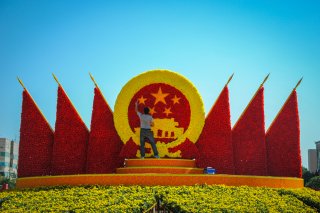China Is Trying to Change What Human Rights Mean
The party’s loose approach to basic facts permeates other more complex issues with concrete and damaging consequences for how China interacts with the world.
In September, China’s Ministry of Foreign Affairs made a surprising announcement, stating that “Human rights for all is the shared pursuit of humanity.” This might appear to be a remarkable pivot for China, especially in light of a new research paper showing that its state-sponsor of forced labor in the western province of Xinjiang continues unabated. After all, if human rights mean anything, it is that slavery is bad.
However, in the very next paragraph, the Ministry states that “There is no one-size-fits-all model for promoting and protecting human rights. All countries’ independent choice of their own path of human rights development should be respected.” According to China, countries should decide for themselves what constitutes human rights based upon “historical background, cultural heritage, social systems and levels of socio-economic development,” and government leaders are the people within a country who should make this determination.
In other words, governments get to decide what the phrase “human rights” should mean. For China, its historical background and cultural heritage apparently indicate that forced labor is just fine.
Beijing’s new interpretation of human rights must be a relief to Vladimir Putin, who can now argue that imprisoning political opponents is part of Russia’s historical background—an incontrovertible fact. For Saudi Arabia, the assassination of journalists would be fine, of course, as would torture and death by regimes in Syria, North Korea, and Afghanistan. Indeed, what horror would not be justified by historical background? Even the Holocaust was built upon a cultural heritage of antisemitism and violence against Jews that went back hundreds of years throughout Europe.
While most people think of human rights as those intrinsic rights that should be conveyed to all people simply because they are human beings, China interprets human rights to mean only those rights that the state wants to extend to citizens, based on those rights that it has traditionally extended to citizens in the past.
Not surprisingly, if the leaders of countries can just define human rights by historical precedent and cultural heritage, then human rights mean nothing at all, which is exactly what China wants.
This rhetorical nullification of rights and freedoms is a standard move for the Chinese Communist Party. The Ministry of Foreign Affairs also argues that “[W]e must safeguard people’s democratic rights,” a perplexing claim for a ministry of an unapologetically authoritarian, single-party government.
This is not just one ministry making these easily falsifiable claims. In conjunction with Xi Jinping’s much-ballyhooed Belt and Road Forum this month, China’s State Council Information Office released a document that argued: “Democracy and freedom are the common goals of humanity.” Once again, moral relativism comes to the rescue of China’s non-democracy. As the document goes on: “There is no single model of democracy that is universally applicable, far less a superior one.”
Democracy is not Coca-Cola, tasting the same across the world as the syrup is produced in one single country. Democracy is not an ornament, but a solution to real problems. Attempts to monopolize the “patent” of democracy, arbitrarily define the ‘standards’ of democracy, and fabricate a false narrative of ‘democracy versus authoritarianism’ to provoke confrontation between political systems and ideologies are practices of fake democracy.
It is not hard to concede that there is not a single model of democracy (the United States and the UK have different versions, for instance). Nor is it problematic to say that democracy is not Coca-Cola (one is a political system, the other a soft drink.) But, notwithstanding that, it is pretty clear that democracy has one main defining trait—namely that people vote for their leaders among viable choices—something that does not happen in China. The PRC does allow for some elections at a local level, but only to choose among pre-approved candidates. It would be hard to call that democracy and freedom under any definition.
With respect to human rights and democracy, China’s claims can be easily recognized as empty and defensive propaganda—functionally, it is geopolitical gaslighting. This obsession with gaslighting permits President Xi Jinping to claim, rather unbelievably, that “[i]deological confrontation, geopolitical rivalry and bloc politics are not a choice for us,” just weeks after adding Iran and Saudi Arabia to the BRICS political bloc that China leads with Russia. It also permits China to argue that the “Chinese nation … never imposes its will upon other nations,” while actively using military vessels to impose its will upon its neighbors around the South China Sea.
But this same approach permeates other more complex issues with concrete and damaging consequences for how China interacts with the world. Transparency, for instance, is critical to open, fair, and non-corrupt economic engagement. China—which relies heavily upon opacity and secret deals in overseas agreements to hide bribery, intimidation, or wildly one-sided terms—nonetheless argues that its Belt and Road Initiative (BRI) is a “fair, equitable and transparent system of international trade and investment.”
Transparency matters. For China’s trillion-dollar effort to boost infrastructure and investment throughout the Global South under the BRI, a lack of transparency has encouraged irresponsible lending, poor assessment of potential risks, broken promises, wasteful, unnecessary, and defective construction, and widespread corruption. Without clear visibility into debt levels, contractual terms, or conditions for repayment, citizens can't hold their leaders to account for troublesome deals through the democratic process.
Of course, as a democracy itself, China probably knew that.
Josh Birenbaum is the Deputy Director of the Center on Economic and Financial Power at the Foundation for Defense of Democracies.
Image: Sergey Malomuzh / Shutterstock.

